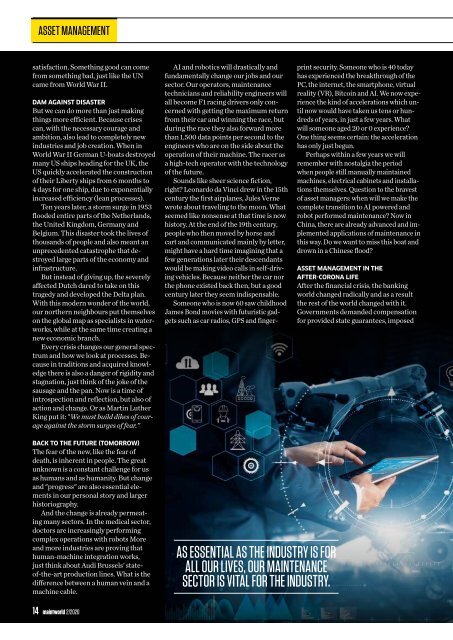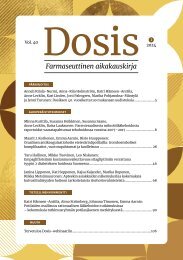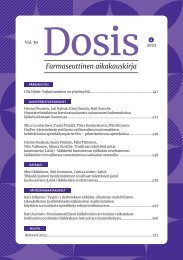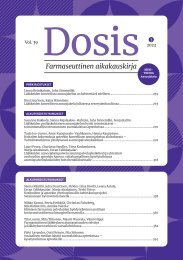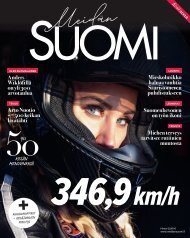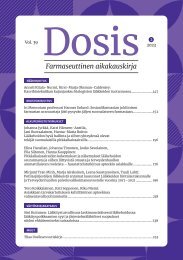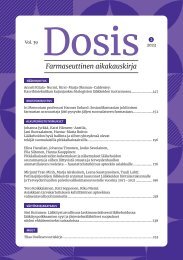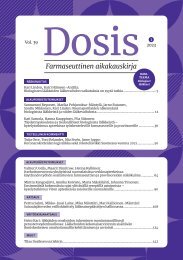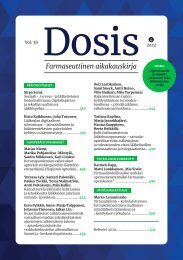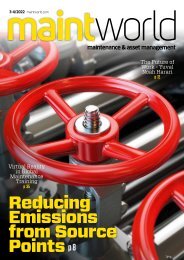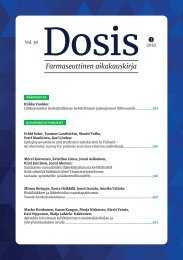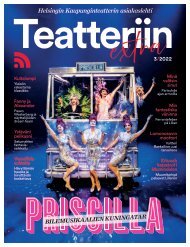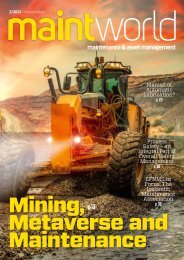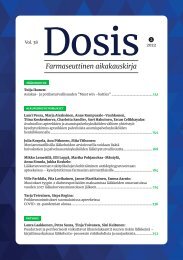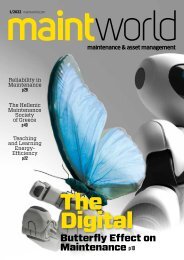Maintworld 2/2020
To the Bravest Asset Managers – Living and working in the post-corona era ADAPTIVE ALIGNMENT - DATA-DRIVEN SPARE PARTS MANAGEMENT - MANAGING THE CRISIS EFFECTIVELY
To the Bravest Asset Managers – Living and working in the post-corona era
ADAPTIVE ALIGNMENT - DATA-DRIVEN SPARE PARTS MANAGEMENT - MANAGING THE CRISIS EFFECTIVELY
You also want an ePaper? Increase the reach of your titles
YUMPU automatically turns print PDFs into web optimized ePapers that Google loves.
ASSET MANAGEMENT<br />
satisfaction. Something good can come<br />
from something bad, just like the UN<br />
came from World War II.<br />
DAM AGAINST DISASTER<br />
But we can do more than just making<br />
things more efficient. Because crises<br />
can, with the necessary courage and<br />
ambition, also lead to completely new<br />
industries and job creation. When in<br />
World War II German U-boats destroyed<br />
many US ships heading for the UK, the<br />
US quickly accelerated the construction<br />
of their Liberty ships from 6 months to<br />
4 days for one ship, due to exponentially<br />
increased efficiency (lean processes).<br />
Ten years later, a storm surge in 1953<br />
flooded entire parts of the Netherlands,<br />
the United Kingdom, Germany and<br />
Belgium. This disaster took the lives of<br />
thousands of people and also meant an<br />
unprecedented catastrophe that destroyed<br />
large parts of the economy and<br />
infrastructure.<br />
But instead of giving up, the severely<br />
affected Dutch dared to take on this<br />
tragedy and developed the Delta plan.<br />
With this modern wonder of the world,<br />
our northern neighbours put themselves<br />
on the global map as specialists in waterworks,<br />
while at the same time creating a<br />
new economic branch.<br />
Every crisis changes our general spectrum<br />
and how we look at processes. Because<br />
in traditions and acquired knowledge<br />
there is also a danger of rigidity and<br />
stagnation, just think of the joke of the<br />
sausage and the pan. Now is a time of<br />
introspection and reflection, but also of<br />
action and change. Or as Martin Luther<br />
King put it: "We must build dikes of courage<br />
against the storm surges of fear."<br />
AI and robotics will drastically and<br />
fundamentally change our jobs and our<br />
sector. Our operators, maintenance<br />
technicians and reliability engineers will<br />
all become F1 racing drivers only concerned<br />
with getting the maximum return<br />
from their car and winning the race, but<br />
during the race they also forward more<br />
than 1,500 data points per second to the<br />
engineers who are on the side about the<br />
operation of their machine. The racer as<br />
a high-tech operator with the technology<br />
of the future.<br />
Sounds like sheer science fiction,<br />
right? Leonardo da Vinci drew in the 15th<br />
century the first airplanes, Jules Verne<br />
wrote about traveling to the moon. What<br />
seemed like nonsense at that time is now<br />
history. At the end of the 19th century,<br />
people who then moved by horse and<br />
cart and communicated mainly by letter,<br />
might have a hard time imagining that a<br />
few generations later their descendants<br />
would be making video calls in self-driving<br />
vehicles. Because neither the car nor<br />
the phone existed back then, but a good<br />
century later they seem indispensable.<br />
Someone who is now 60 saw childhood<br />
James Bond movies with futuristic gadgets<br />
such as car radios, GPS and fingerprint<br />
security. Someone who is 40 today<br />
has experienced the breakthrough of the<br />
PC, the internet, the smartphone, virtual<br />
reality (VR), Bitcoin and AI. We now experience<br />
the kind of accelerations which until<br />
now would have taken us tens or hundreds<br />
of years, in just a few years. What<br />
will someone aged 20 or 0 experience?<br />
One thing seems certain: the acceleration<br />
has only just begun.<br />
Perhaps within a few years we will<br />
remember with nostalgia the period<br />
when people still manually maintained<br />
machines, electrical cabinets and installations<br />
themselves. Question to the bravest<br />
of asset managers: when will we make the<br />
complete transition to AI powered and<br />
robot performed maintenance? Now in<br />
China, there are already advanced and implemented<br />
applications of maintenance in<br />
this way. Do we want to miss this boat and<br />
drown in a Chinese flood?<br />
ASSET MANAGEMENT IN THE<br />
AFTER-CORONA LIFE<br />
After the financial crisis, the banking<br />
world changed radically and as a result<br />
the rest of the world changed with it.<br />
Governments demanded compensation<br />
for provided state guarantees, imposed<br />
BACK TO THE FUTURE (TOMORROW)<br />
The fear of the new, like the fear of<br />
death, is inherent in people. The great<br />
unknown is a constant challenge for us<br />
as humans and as humanity. But change<br />
and "progress" are also essential elements<br />
in our personal story and larger<br />
historiography.<br />
And the change is already permeating<br />
many sectors. In the medical sector,<br />
doctors are increasingly performing<br />
complex operations with robots More<br />
and more industries are proving that<br />
human-machine integration works,<br />
just think about Audi Brussels' stateof-the-art<br />
production lines. What is the<br />
difference between a human vein and a<br />
machine cable.<br />
AS ESSENTIAL AS THE INDUSTRY IS FOR<br />
ALL OUR LIVES, OUR MAINTENANCE<br />
SECTOR IS VITAL FOR THE INDUSTRY.<br />
14 maintworld 2/<strong>2020</strong>


